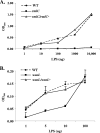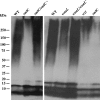Glycosylation of the collagen adhesin EmaA of Aggregatibacter actinomycetemcomitans is dependent upon the lipopolysaccharide biosynthetic pathway
- PMID: 20061477
- PMCID: PMC2820841
- DOI: 10.1128/JB.01453-09
Glycosylation of the collagen adhesin EmaA of Aggregatibacter actinomycetemcomitans is dependent upon the lipopolysaccharide biosynthetic pathway
Abstract
The human oropharyngeal pathogen Aggregatibacter actinomycetemcomitans synthesizes multiple adhesins, including the nonfimbrial extracellular matrix protein adhesin A (EmaA). EmaA monomers trimerize to form antennae-like structures on the surface of the bacterium, which are required for collagen binding. Two forms of the protein have been identified, which are suggested to be linked with the type of O-polysaccharide (O-PS) of the lipopolysaccharide (LPS) synthesized (G. Tang et al., Microbiology 153:2447-2457, 2007). This association was investigated by generating individual mutants for a rhamnose sugar biosynthetic enzyme (rmlC; TDP-4-keto-6-deoxy-d-glucose 3,5-epimerase), the ATP binding cassette (ABC) sugar transport protein (wzt), and the O-antigen ligase (waaL). All three mutants produced reduced amounts of O-PS, and the EmaA monomers in these mutants displayed a change in their electrophoretic mobility and aggregation state, as observed in sodium dodecyl sulfate (SDS)-polyacrylamide gels. The modification of EmaA with O-PS sugars was suggested by lectin blots, using the fucose-specific Lens culinaris agglutinin (LCA). Fucose is one of the glycan components of serotype b O-PS. The rmlC mutant strain expressing the modified EmaA protein demonstrated reduced collagen adhesion using an in vitro rabbit heart valve model, suggesting a role for the glycoconjugant in collagen binding. These data provide experimental evidence for the glycosylation of an oligomeric, coiled-coil adhesin and for the dependence of the posttranslational modification of EmaA on the LPS biosynthetic machinery in A. actinomycetemcomitans.
Figures







References
-
- Bengoechea, J., H. Najdenski, and M. Skurnik. 2004. Lipopolysaccharide O antigen status of Yersinia enterocolitica O:8 is essential for virulence and absence of O antigen affects the expression of other Yersinia virulence factors. Mol. Microbiol. 52:451-469. - PubMed
Publication types
MeSH terms
Substances
Grants and funding
LinkOut - more resources
Full Text Sources
Other Literature Sources
Research Materials

